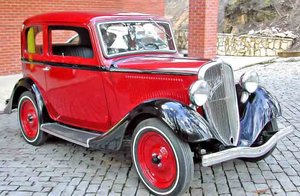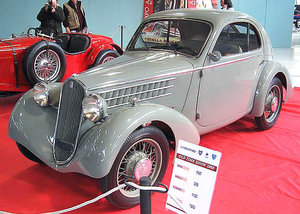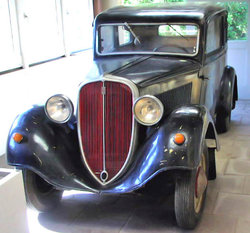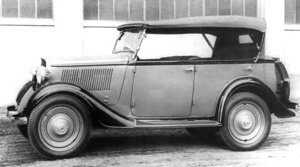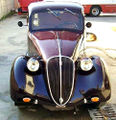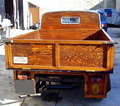Difference between revisions of "Fiat 508"
m |
m |
||
| (28 intermediate revisions by the same user not shown) | |||
| Line 1: | Line 1: | ||
{{X}} | {{X}} | ||
| − | + | {| border=1 cellspacing=3 cellpadding=4 style="float:right; margin:0 0 .5em 1em; width:250px; background:#505050; border-collapse:collapse; border:1px solid #999; font-size:83%; line-height:1.5; " summary="Infobox Automobile" | |
| − | [[Image: | + | |- style="text-align:center; background:#505050;" |
| + | | colspan=2 style="padding:0; background:#333333; color:#fff; border-bottom:1px solid #999;" |[[Image:Fiat 508 Balilla 1933.jpg|280px]] | ||
| + | |- style="color:#fff; background:darkred; font-size:larger;" | ||
| + | ! colspan=2 |'''Fiat 508 Balilla''' | ||
| + | |- | ||
| + | | Manufacturer || [[Fiat]] | ||
| + | |- | ||
| + | | Production Years || 1932-1937 | ||
| + | |- | ||
| + | | Production || Italy 170,176 <br/> [[Simca]] 6CV-Fiat: 26,472 <br/> Polski-Fiat 508: n/a | ||
| + | |- | ||
| + | | Previous model || [[Fiat 509]] | ||
| + | |- | ||
| + | | Template || [[Fiat 1100]] | ||
| + | |- | ||
| + | | Class || Average Range | ||
| + | |- | ||
| + | | Engines || Gasoline 4-Cylinder 995/1089 cm3 | ||
| + | |- | ||
| + | | Transmission || Propulsion | ||
| + | |- | ||
| + | | Superstructures || limousine - Limousine - Cabriolet | ||
| + | |- | ||
| + | | Length || 3145 | ||
| + | |- | ||
| + | | Width || 1400 | ||
| + | |- | ||
| + | | Height || 1530 | ||
| + | |- | ||
| + | | Weight || 685-710 | ||
| + | |- | ||
| + | | | ||
| + | |- | ||
| + | | colspan=2 style="padding:0; background:#333333; color:#fff; border-bottom:1px solid #999;" |<videoflash>X2epidXakgI|280|200</videoflash> | ||
| + | |} | ||
| − | The '''508 Balilla''' was a car | + | The'' 'Fiat 508 Balilla''' is an [[automobile]] famous, built by the manufacturer [[Italy]] n [[Fiat]] in the 1930s that contributed greatly to the motorization of the middle classes the country. Fiat Balilla represented in the eyes of the Italians of that time, an "object of desire." Its success is attributable to a very courageous decision of the Italian manufacturer to launch this car in a little pomp and especially the quality of the work of his designers, who made a car with average grade of benefits and the cost of use was very low. |
| + | |||
| + | |||
| + | == History == | ||
| + | The project is the work of various famous figures of those years as engineers: Nebbia, buttocks, [[Dante Giacosa | Giacosa]] and Zerbi which created a class of car but with reasonable costs. The new model will be presented at the fair [[Milan]] April 12 [[1932]] during [[Motor Show]]. | ||
| + | |||
| + | |||
| + | The Fiat 508 Balilla in its 1st version, was characterized by a three speed [[gearbox]]. | ||
| + | |||
| + | |||
| + | It was equipped with a [[motor]] mounted at the front line four-cylinder Fiat 995 cm3 developing 20 hp at 3500 rpm, equipped with drum brakes on all 4 wheels, it exceeded 80 km/h maximum speed. | ||
| + | |||
| + | |||
| + | This first version was replaced two years later by the Fiat 508 Balilla second set, featuring a four-speed box and a new aerodynamic body with 2 or 4 doors. | ||
| + | |||
| + | |||
| + | Production between [[1932]] and [[1937]] reached 170,176 copies, a feat at that time. | ||
| + | [[Image:Fiat 508 Rocznik 1934.jpg|thumb|300px|Fiat 508 Balilla 2nd series]] | ||
| + | |||
| + | [[Image:Fiat 508-S-Balilla BerlMM.JPG|thumb|300px|Balilla Fiat 508 Coupe]] | ||
| + | |||
| + | === The origin of the nickname Balilla === | ||
| + | Many believe that this nickname was given because of fascism in Italy. This is not true. Indeed, there are few people who have written about this strange nickname. The term "Balilla" does not originate during the fascist era, but rather was used during this period. In reality Balilla "was the nickname of Giovanni Battista Perasso who, in 1746 in Genoa threw a stone against an Austrian officer for rebelling against the Austrian invasion of the region. | ||
| + | |||
| + | The Fiat 508 was not the first product to bear this nickname. Previously on the plane has a Fiat A1, an agricultural tractor Motomeccanica and a series of submarines of the navy of the King of Italy. | ||
| + | [[Image:MHV NSU-Fiat 1000 1934.01.jpg|thumb|250px|Fiat NSU Balilla 1000]] | ||
| + | |||
| + | |||
| + | ===Sale Price === | ||
| + | |||
| + | Due to its mass production, the price of the car was very competitive, only £ 10,800 against the ire ires £ 18,500 at the time, for the [[Fiat 509]] it was replacing. The number of copies produced daily by Fiat in [[Turin]] in the new factory [[Lingotto]], not counting the production abroad was higher than the production models of competitors per week. | ||
| + | |||
| + | |||
| + | === Both sets and versions === | ||
| + | |||
| + | The Balilla was produced from 1932 to 1937 in two series: | ||
| + | * The first had a traditional body, in line with the [[Fiat 509]] it was replacing. She had a gearbox with 3 reports, which was his distinctive appellation with the second series. | ||
| + | * The second set had a more aerodynamic body and a gear box 4 speed. | ||
| + | |||
| + | Both series have a wide range which included versions: sedan, spider, Tornado, military colonial sport spider berlinetta and Mille Miglia. Many bodybuilders, as was the great fashion of the time, habillèrent bare chassis produced by the plant for them. Are the main Garavini, [[Savio]], Balbo, [[Bertone]] Casaro and [[Ghia]]. | ||
| + | |||
| + | |||
| + | == The Fiat 508 Balilla abroad == | ||
| + | |||
| + | Given the very strong demand, the Fiat 508 Balilla was also manufactured under license abroad: | ||
| + | * In [[Poland]] as [[Polski Fiat 508]] in 3 sets. The manufacture was halted in 1939 by the Nazi invasion. No information on the exact number of cars but it seems to be in the order of several thousands in the [[Centralne Warsztaty Samochodowe]] factory in [[Poland]].[[Image:PL Fiat 508 III Junak.jpg|thumb|right|250px|'''Polski Fiat 508 III Junak built in Poland''']] | ||
| + | * In [[Germany]] under the names of [[Fiat NSU 1000]] between 1934 and 1938 to about 6000 copies and [[NSU-FIAT 1100]] between 1938 and 1941 to about 5000 copies, | ||
| + | * In [[France]] Safafa licensed by [[Fiat]] under the label [[Simca]] Fiat 6CV FIII-power tax 6 hp. Archives confirm overall production between September 18 1932 and 1937 of 26,472 copies. | ||
| + | |||
| + | |||
| + | It will be replaced by the [[Fiat 1100]] submitted in [[1939]] with the code project Fiat 508C. | ||
| + | |||
| + | [[Image:FIAT508.jpg|thumb|300px|right|'''1934 Fiat Ballila Coupe''']] | ||
| + | [[Image:1934 Fiat Ballila Torpedo Spider.jpg|thumb|right|300px|'''1934 Fiat Ballila Torpedo Spider''']] | ||
| + | |||
| + | |||
| + | == Technical == | ||
| + | |||
| + | * [[Engine]] Fiat 108 4-cylinder in-line 995 cm3 | ||
| + | * [[Rate compression | Compression ratio]]: 5.8 / 1 | ||
| + | * Power: 20 hp at 3400 rpm | ||
| + | * Distribution: [[valve]] s side | ||
| + | * Food: A [[carburetor]] mono-body | ||
| + | * [[Transmission (mechanics) | transmission]]: propulsion, box 3 speed (1 ((re)) version), 4 speed (2 ((e)) version) | ||
| + | * [[Body]]: Steel, 2 doors, 4 seats | ||
| + | * [[Vehicle Suspension | Suspension]] s: ant. and post. [[wheel]] rigid, semi-elliptic blades | ||
| + | * [[Brake]] s: on hydraulic 4-wheel | ||
| + | * [[Pneumatic (vehicle) | tire]] s: 4.00 x 17 | ||
| + | * Tank: 26 l | ||
| + | * Maximum speed: 80 km / h | ||
| + | |||
| + | |||
| + | ==Overall production == | ||
| + | * In Italy: | ||
| + | ** 1st series 3 speed: 41,395 copies | ||
| + | ** 2nd series 4 speed: 71,700 copies | ||
| + | ** 508C 1100: 57,000 copies | ||
| + | ** 1100 to 1939: 74,000 copies | ||
| + | ** 1100: 401 copies | ||
| + | ** 1100 B / BL: 25,000 copies | ||
| + | 1100 ** E / EL / ELS: 58,000 copies. | ||
| + | * Abroad: | ||
| + | ** France Simca Fiat 6 HP: 26,472 copies | ||
| + | ** Poland Polski Fiat 508 I / II / III: unknown exact production, between 6 and 10,000 copies, | ||
| + | ** Germany NSU-Fiat, about 11,000, exact figure unknown. | ||
| + | ** Fiat Hispania in Spain: number unknown. | ||
| + | |||
| + | |||
| + | {{-}} | ||
| + | |||
| + | ==Fiat 508 C== | ||
| + | |||
| + | <gallery> | ||
| + | image:1938 Fiat Truck 508C Nuova Balilla 1100 Furgone 1.jpg|<font color=>'''1938 Fiat Truck 508C Nuova Balilla 1100 Furgone''' [http://www.carandclassic.co.uk <small>Source</small>] | ||
| + | image:1938 Fiat Truck 508C Nuova Balilla 1100 Furgone 2.jpg | ||
| + | image:1938 Fiat Truck 508C Nuova Balilla 1100 Furgone 3.jpg | ||
| + | </gallery> | ||
| + | |||
| + | |||
| + | ==Fiat 508 S== | ||
| + | |||
| + | <gallery> | ||
| + | image:1938 Fiat Balilla Coppa D'Oro Mille Miglia 1.jpg|<font color=>'''1938 Fiat Balilla Coppa D'Oro Mille Miglia''' [http://www.carandclassic.co.uk <small>Source</small>] | ||
| + | image:1938 Fiat Balilla Coppa D'Oro Mille Miglia 2.jpg | ||
| + | image:1938 Fiat Balilla Coppa D'Oro Mille Miglia 3.jpg | ||
| + | </gallery> | ||
| + | |||
| + | == External Links == | ||
| + | |||
| + | * [http://www.simca-fiat.info/simca-fiat/simcafiat.html The history of Simca / Fiat on the site of Club Simca France] | ||
| + | * [http://www.fiatbalilla.fr site and forum for collectors of fiat balilla] | ||
| − | |||
| Line 12: | Line 155: | ||
{{Fiat Historic Timeline}} | {{Fiat Historic Timeline}} | ||
{{Fiat SPA}} | {{Fiat SPA}} | ||
| + | |||
| + | [[Category:Fiat|508]] | ||
| + | [[Category:1900s automobiles]] | ||
| + | [[Category:Veteran vehicles]] | ||
| + | [[Category:Vehicles introduced in 1901]] | ||
Latest revision as of 18:39, 31 October 2009
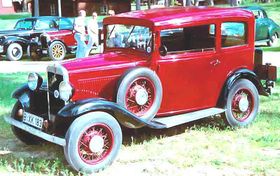
| |
| Fiat 508 Balilla | |
|---|---|
| Manufacturer | Fiat |
| Production Years | 1932-1937 |
| Production | Italy 170,176 Simca 6CV-Fiat: 26,472 Polski-Fiat 508: n/a |
| Previous model | Fiat 509 |
| Template | Fiat 1100 |
| Class | Average Range |
| Engines | Gasoline 4-Cylinder 995/1089 cm3 |
| Transmission | Propulsion |
| Superstructures | limousine - Limousine - Cabriolet |
| Length | 3145 |
| Width | 1400 |
| Height | 1530 |
| Weight | 685-710 |
The 'Fiat 508 Balilla' is an automobile famous, built by the manufacturer Italy n Fiat in the 1930s that contributed greatly to the motorization of the middle classes the country. Fiat Balilla represented in the eyes of the Italians of that time, an "object of desire." Its success is attributable to a very courageous decision of the Italian manufacturer to launch this car in a little pomp and especially the quality of the work of his designers, who made a car with average grade of benefits and the cost of use was very low.
History
The project is the work of various famous figures of those years as engineers: Nebbia, buttocks, Giacosa and Zerbi which created a class of car but with reasonable costs. The new model will be presented at the fair Milan April 12 1932 during Motor Show.
The Fiat 508 Balilla in its 1st version, was characterized by a three speed gearbox.
It was equipped with a motor mounted at the front line four-cylinder Fiat 995 cm3 developing 20 hp at 3500 rpm, equipped with drum brakes on all 4 wheels, it exceeded 80 km/h maximum speed.
This first version was replaced two years later by the Fiat 508 Balilla second set, featuring a four-speed box and a new aerodynamic body with 2 or 4 doors.
Production between 1932 and 1937 reached 170,176 copies, a feat at that time.
The origin of the nickname Balilla
Many believe that this nickname was given because of fascism in Italy. This is not true. Indeed, there are few people who have written about this strange nickname. The term "Balilla" does not originate during the fascist era, but rather was used during this period. In reality Balilla "was the nickname of Giovanni Battista Perasso who, in 1746 in Genoa threw a stone against an Austrian officer for rebelling against the Austrian invasion of the region.
The Fiat 508 was not the first product to bear this nickname. Previously on the plane has a Fiat A1, an agricultural tractor Motomeccanica and a series of submarines of the navy of the King of Italy.
Sale Price
Due to its mass production, the price of the car was very competitive, only £ 10,800 against the ire ires £ 18,500 at the time, for the Fiat 509 it was replacing. The number of copies produced daily by Fiat in Turin in the new factory Lingotto, not counting the production abroad was higher than the production models of competitors per week.
Both sets and versions
The Balilla was produced from 1932 to 1937 in two series:
- The first had a traditional body, in line with the Fiat 509 it was replacing. She had a gearbox with 3 reports, which was his distinctive appellation with the second series.
- The second set had a more aerodynamic body and a gear box 4 speed.
Both series have a wide range which included versions: sedan, spider, Tornado, military colonial sport spider berlinetta and Mille Miglia. Many bodybuilders, as was the great fashion of the time, habillèrent bare chassis produced by the plant for them. Are the main Garavini, Savio, Balbo, Bertone Casaro and Ghia.
The Fiat 508 Balilla abroad
Given the very strong demand, the Fiat 508 Balilla was also manufactured under license abroad:
- In Poland as Polski Fiat 508 in 3 sets. The manufacture was halted in 1939 by the Nazi invasion. No information on the exact number of cars but it seems to be in the order of several thousands in the Centralne Warsztaty Samochodowe factory in Poland.
- In Germany under the names of Fiat NSU 1000 between 1934 and 1938 to about 6000 copies and NSU-FIAT 1100 between 1938 and 1941 to about 5000 copies,
- In France Safafa licensed by Fiat under the label Simca Fiat 6CV FIII-power tax 6 hp. Archives confirm overall production between September 18 1932 and 1937 of 26,472 copies.
It will be replaced by the Fiat 1100 submitted in 1939 with the code project Fiat 508C.
Technical
- Engine Fiat 108 4-cylinder in-line 995 cm3
- Compression ratio: 5.8 / 1
- Power: 20 hp at 3400 rpm
- Distribution: valve s side
- Food: A carburetor mono-body
- transmission: propulsion, box 3 speed (1 ((re)) version), 4 speed (2 ((e)) version)
- Body: Steel, 2 doors, 4 seats
- Suspension s: ant. and post. wheel rigid, semi-elliptic blades
- Brake s: on hydraulic 4-wheel
- tire s: 4.00 x 17
- Tank: 26 l
- Maximum speed: 80 km / h
Overall production
- In Italy:
- 1st series 3 speed: 41,395 copies
- 2nd series 4 speed: 71,700 copies
- 508C 1100: 57,000 copies
- 1100 to 1939: 74,000 copies
- 1100: 401 copies
- 1100 B / BL: 25,000 copies
1100 ** E / EL / ELS: 58,000 copies.
- Abroad:
- France Simca Fiat 6 HP: 26,472 copies
- Poland Polski Fiat 508 I / II / III: unknown exact production, between 6 and 10,000 copies,
- Germany NSU-Fiat, about 11,000, exact figure unknown.
- Fiat Hispania in Spain: number unknown.
Fiat 508 C
1938 Fiat Truck 508C Nuova Balilla 1100 Furgone Source
Fiat 508 S
1938 Fiat Balilla Coppa D'Oro Mille Miglia Source
External Links
- The history of Simca / Fiat on the site of Club Simca France
- site and forum for collectors of fiat balilla
| Fiat car timeline, European market, 1899s-1949s Next -> | ||||||||||||||||||||||||||||||||||||||||||||||||||||
|---|---|---|---|---|---|---|---|---|---|---|---|---|---|---|---|---|---|---|---|---|---|---|---|---|---|---|---|---|---|---|---|---|---|---|---|---|---|---|---|---|---|---|---|---|---|---|---|---|---|---|---|---|
| Type | 1890s | 1900s | 1910s | 1920s | 1930s | 1940s | ||||||||||||||||||||||||||||||||||||||||||||||
| 8 | 9 | 0 | 1 | 2 | 3 | 4 | 5 | 6 | 7 | 8 | 9 | 0 | 1 | 2 | 3 | 4 | 5 | 6 | 7 | 8 | 9 | 0 | 1 | 2 | 3 | 4 | 5 | 6 | 7 | 8 | 9 | 0 | 1 | 2 | 3 | 4 | 5 | 6 | 7 | 8 | 9 | 0 | 1 | 2 | 3 | 4 | 5 | 6 | 7 | 8 | 9 | |
| City car | 3,5 HP | 500 A / 500 B (Topolino) ... | ||||||||||||||||||||||||||||||||||||||||||||||||||
| Small family car | 6 HP 8 HP 10 HP |
509 / 509 S | 508 (Ballila) | Ballila 1100 A / B ... | ||||||||||||||||||||||||||||||||||||||||||||||||
| Family car | 1 | 1A / Zero | 70 | 501 / 501 S / 502 / 503 | 514 / 515 | 1500 | ||||||||||||||||||||||||||||||||||||||||||||||
| Large family car | Brevetti | 2 | 2B | 505 | 507 | 518 | ||||||||||||||||||||||||||||||||||||||||||||||
| 12 HP / 16-20 HP / 16-24 HP | 15-25 HP Brevetti | 520 / 521 | 522 / 524 | 527 | 2800 | |||||||||||||||||||||||||||||||||||||||||||||||
| Executive car | 20-30 HP | 3 | 3A / 3Ter | 510 | 512 | 525 / 525 S | ||||||||||||||||||||||||||||||||||||||||||||||
| 24-32 HP / 60 HP | 28-40 HP / 30-45 HP / 50 HP | 4 / 5 / 6 | 520 "Superfiat" | 519 / 519 S | ||||||||||||||||||||||||||||||||||||||||||||||||
| Race car | ||||||||||||||||||||||||||||||||||||||||||||||||||||
| 130 HP Corsa | ||||||||||||||||||||||||||||||||||||||||||||||||||||
